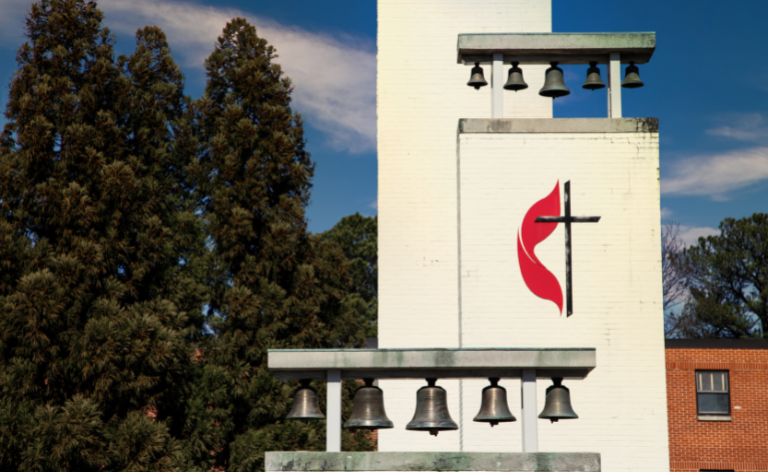Methodist and Foursquare churches originated in England and America, respectively, yet both traditions are worldwide. Many people know where such a church is near them and may even know those who attend it. Yet, even though many know that Methodist and Foursquare are each Christian denominations, they don’t know their similarities and differences.
Methodism is a Protestant Christian denomination that English evangelist, John Wesely, founded in the 18th century. The International Church of the Foursquare Gospel is a Protestant denomination with Pentecostal convictions that Aimee Semple McPherson started in the early 20th century.
What do the names “Methodist” and “Foursquare” mean? What is the theological and social worldview of each tradition? Which denomination has more members? How do their beliefs about the Trinity, the Bible, spiritual gifts, and the end times compare? See the comparison charts below to learn the answers to these questions and others.
Also, see What’s the Difference Between Methodists and Catholics? to learn more.

Methodist and Foursquare: What’s the Difference?
Methodist and Foursquare are Protestant Christian denominations. Churches in these traditions have more in common with each other than they do with many other Christian denominations, including Lutheranism, Presbyterianism, and most Baptist churches. However, Methodism has many similarities with Episcopalianism, and Foursquare churches have much in common with the Assemblies of God.
| Methodism | Foursquare | |
|---|---|---|
| Founder | John Wesley (1703-1791) | Aimee Semple McPherson (1890-1944) |
| Origin | Wesely wanted to create spiritual reform in the Church of England in the 18th century. He didn’t intend to start a new denomination, but that’s what occurred when leaders rejected his ideas. | Called “Sister Aimee,” McPherson was a Canadian Pentecostal evangelist, healer, and celebrity, who started the Foursquare Church in the 1920s and led the denomination until her death. |
| Name | Wesley, his brother Charles (1707-1788), and other men at Oxford University, including evangelist George Whitefield (1714-1770), started a club that emphasized processes or “methods” of spiritual growth. | The name “Foursquare” comes from McPherson’s interpretation of the first chapter of Ezekiel. The four creatures Ezekiel mentioned correspond to the four offices of Christ (see below). The name reflects a Christ-centered interpretation of Ezekiel 1. |
| Early influencer(s) | Besides John Wesley, Charles Wesley and George Whitefield played key roles in the formation of the denomination. | Aimee’s son, Rolf K. McPherson (1913-2009), took over the denomination’s leadership when she died. |
| Significant writing outside the Bible | The Apostles’ Creed, The Nicene Creed; Wesley edited the 39 Articles of Religion, removing the Calvinist teachings in it; he also edited the Book of Common Prayer after the Revolutionary War; the United Methodist Hymnal is important. | McPherson’s doctrinal statements: “Declaration of Faith of the International Church of the Foursquare Gospel” and “Creedal Statements of the International Church of the Foursquare Gospel.” The latter is a concise summary of the former. |
| Methodism | Foursquare | |
|---|---|---|
| Organization | The term “connectionalism” describes the network of relationships among Methodist churches today. “Bishops” lead churches within the framework of Episcopalian polity. | The Foursquare denomination isn’t congregational. Local churches aren’t autonomous in relation to the denomination, though they are regarding the government. The denomination’s government is closest to Episcopalian, which is rooted in McPherson’s requirement of having the final say in all matters. |
| Divisions | There are many denominations in the Methodist tradition. The United Methodist Church (UMC) is the largest. The African Methodist Episcopal Church (AMEC) is the second largest. | The Foursquare Church hasn’t experienced any significant splits in its 100-year existence. |
| Theological and social worldview | It depends on the denomination. Many churches in the UMC denomination have adopted liberal perspectives on many social and theological issues in recent decades. Other smaller denominations maintain conservative positions, such as the Evangelical Methodist Church (EMC). | The Foursquare Church is generally conservative on theological and social issues. However, like the Assemblies of God, the denomination ordains women, which some Christian traditions consider modern and progressive. |
| Membership | Approximately 80 million globally | 8.6 million members globally |
The name International Church of the “Foursquare” Gospel came from a sermon McPherson preached in 1922 on the first chapter of Ezekiel.
Ezekiel 1:10 describes what the prophet of Israel saw: “As for the likeness of their faces, each had a human face. The four had the face of a lion on the right side, the four had the face of an ox on the left side, and the four had the face of an eagle” (ESV).
McPherson taught that the man in the passage represents Jesus as Savior; the lion represents Jesus as Baptizer with the Holy Spirit; the ox represents Jesus as Healer, and the eagle represents Jesus as Coming King.
Also, see What’s the Difference Between Methodists and Lutherans? to learn more.

Comparison of Beliefs Between Methodist and Foursquare
The Methodist and Foursquare denominations are Protestant, as opposed to Roman Catholic or Eastern Orthodox. Therefore, both traditions have historically ascribed to the Bible as the ultimate authority on doctrine and conduct and reject other authority figures in non-Protestant traditions like the pope.
Some observers note that Methodism’s shift toward liberalism in recent years signals their departure from Protestantism’s emphasis on the role of Scripture in the life of believers and churches. Nevertheless, the Methodist beliefs explained below reflect the historical convictions of the tradition.
| BELIEFS | Methodism | Foursquare |
|---|---|---|
| Theology | Because Methodists are Protestant, they believe that salvation is by grace through faith in Christ and not according to works. Methodists are Arminian. Their doctrine is sometimes called “Wesleyan theology” or “Wesleyan-Arminian theology.” | Foursquare churches are Protestant. They are Arminian and Pentecostal. The tradition is rooted in the Holiness movement, which is rooted in Methodism. |
| God | Methodists believe in the Trinity. One God exists in three persons: Father, Son, and Holy Spirit. | Foursquare churches are also Trinitarian. Their doctrinal statement reads, “We believe that God is Triune: Father, Son and Holy Spirit (2 Cor. 13:14).” |
| Jesus | Jesus is the second person of the Trinity who was virgin-born to Mary. He was sinless. Jesus died on the cross for sin and rose three days later, defeating death. | Foursquare churches also believe in the deity of Christ, his atoning death, and his resurrection from the dead. |
| Holy Spirit | The Holy Spirit is the third member of the Trinity who indwells Christians. | Likewise, the Foursquare tradition teaches that the Holy Spirit is fully divine. |
| The Bible | Methodists believe the Bible is inspired. Some conservative Methodist denominations in America accept the term “inerrancy,” which means that Scripture is without error. | The Foursquare belief statement reads, “We believe that the Bible is God-inspired (2 Tim. 3:16, 17).” |
| Sin | Methodism teaches that prevenient grace overcomes original sin. “Prevenient” refers to it being universal and preconscious. However, people can resist it. | “We believe that man is created in the image of God but, by voluntary disobedience, fell from perfection thereby imbuing humanity with sinfulness (Rom. 5:12).” |
Also, see What’s the Difference Between Methodists and Anglicans? to learn more.

| BELIEFS | Methodism | Foursquare |
|---|---|---|
| View of the atonement | Moderate-liberal denominations view Christ as a martyr and his death as a form of activism for marginalized people. Conservatives believe Christ died in the place of sinners and as a punishment for their sins. | “We believe that, while we were sinners, Christ died for us—pardoning all who believe in Him (John 3:16; Rom. 5:8).” |
| Salvation | Methodists are Arminian, as opposed to Calvinists or Reformed. Prevenient grace leads people to seek God and prompts an awareness of sin. | “We believe that we receive salvation when we come to God through faith in the atoning work of Jesus on the cross. Salvation is God’s gift to us (Eph. 2:8).” |
| Perfectionism | “Perfectionism” is the belief that Christians can be freed from sin in this life. Wesley taught Christians can be perfect in love in this lifetime and free from all willful sin. | The Foursquare church believes in the doctrine of perfection. Non-perfectionist traditions believe that sanctification is perfected at death for the believer. |
| Spiritual gifts | Some Methodists are cessationists; others are continuationists. Pentecostal expressions have been associated with revivalism in the Methodist tradition, which has historically been a topic of internal debate and tension. | Continuationism is central to Foursquare theology: “We believe that the Holy Spirit has gifts to bestow upon Christians (1 Cor. 12:1-11) and that we should show spiritual fruit as evidence of a Spirit-filled life (Gal. 5:22-25).” |
| Water Baptism | Methodist pastors baptize infants as a sign of regeneration. Adult converts can be baptized, often by sprinkling. | The Foursquare church practices “Believer’s Baptism.” “We believe that baptism by immersion in water is an outward sign of an inward work (Matt. 28:19; Rom. 6:4).” |
| Communion | Methodists believe in the real presence of Christ, making the bread and cup more than a mere memorial, like in some Protestant traditions. | Foursquare holds to the memorial view: “We believe in commemorating the Lord’s Supper by the symbolic use of bread and fruit of the vine (1 Cor. 11:24, 25).” |
| Eschatology | The Second Coming of Christ is a primary doctrine. Methodists interpret the millennium according to Amillennial theology. This means it interprets the 1,000-year period described in Revelation 20:1-6 figuratively and defines it as the time between Christ’s first and second coming (i.e., the Church Age). | Foursquare holds to the Premillennial, pre-tribulation rapture of the Church. It believes in the Second of Christ. “We believe that the second coming of Christ is personal and imminent (1 Thess. 4:16, 17; Titus 2:11-13).” |
Also, see What’s the Difference Between Methodists and Pentecostals? to learn more.
References:
[1] Source
[2] Source
Related Questions
Explore the rich diversity of Christian denominations. Learn how varied beliefs, practices, and traditions shape the Christian faith. Understanding these differences can deepen your insight into...
Christianity is an important part of the American story in its various denominational expressions. Some denominations came to America from Europe, while others started on American soil. The size of a...
